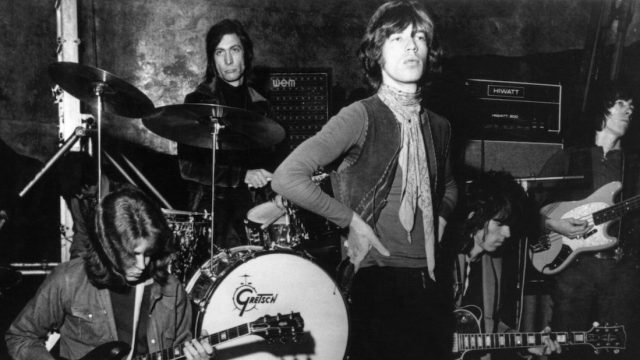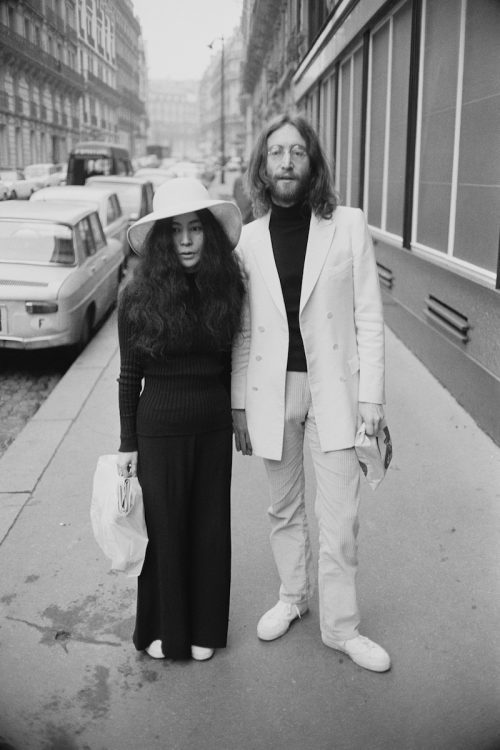7 Hit ’70s Songs That Are Offensive by Today’s Standards

The ’70s were half a century ago, and that fact is especially apparent when you look back at the media of the time. Watch a movie or TV show from that decade or listen to a song, and you won’t just notice outdated fashion, interiors, and slang, but you’ll also come across plots, characters, and words that are offensive, especially by the standards of 2023. When it comes to music in particular, there are plenty of songs from the ’70s that are offensive to listeners now.
The list below is comprised of seven songs from the ’70s that wouldn’t fly today, either because of racist or misogynistic lyrics or because they’re about unacceptable or illegal activities, such as sex with underage girls or drinking and driving. Read on to find out more about these politically incorrect songs by artists like Elton John and the Rolling Stones. (Note that there’s questionable content in the clips below—obviously!)
READ THIS NEXT: 7 Hit ’80s Songs That Are Offensive by Today’s Standards.
1
“Brown Sugar” by The Rolling Stones (1971)
Without listening too closely, one might think that “Brown Sugar” is simply about a white man objectifying Black women—which is bad enough on its own. But the song does so by telling a story about slavery, including Black women being beaten and raped by slave owners. The opening lines are: “Gold Coast slave ship bound for cotton fields/Sold in a market down in New Orleans/Scarred old slaver, know he’s doing alright/Hear him whip the women just around midnight.”
Rolling Stones frontman and co-writer of the song Mick Jagger has said that he wouldn’t write “Brown Sugar” today.
“God knows what I’m on about in that song. It’s such a mishmash. All the nasty subjects in one go,” he told Rolling Stone in 1995 (via Far Out Magazine). “I never would write that song now.” He added, “I would probably censor myself. I’d think, ‘Oh God, I can’t. I’ve got to stop. I can’t just write raw like that.’”
In 2022, The Independent reported that the last time the band played the song live was in 2019.
2
“Woman Is the [N-word] of the World” by John Lennon and Yoko Ono (1972)

This one was already controversial upon its release, but the fact that it exists at all is even more surprising today. John Lennon and Yoko Ono wrote a song called “Woman Is the [N-word] of the World,” which is meant to be a feminist song about women being mistreated and unequal to men, but they went about it by repeatedly using a racial slur.
Lyrics include: “When she’s young we kill her will to be free/While telling her not to be so smart we put her down for being so dumb” and “Woman is the [expletive] of the world, yes she is/If you don’t believe me take a look to the one you’re with/Woman is the slave to the slaves.”
As reported by Far Out, some radio stations banned the song. During an interview from around the time the song came out, Lennon defended the song and said the title came from a quote Ono gave during an interview a couple of years prior.
“Obviously there were a few people that reacted strangely to it, but usually they were white and male,” Lennon said. He added, “I think the word [n-word] has changed and it does not have the same meaning that it used to.” The Beatles musician also claimed that his Black friends told him he had the “right” to use the word.
3
“Half-Breed” by Cher (1973)
In 1973, Cher released a song titled “Half-Breed” that is written from the perspective of a woman who is half Native American and half white. Half-Breed is also the title of her album from the same year. Cher, for the record, is half Armenian through her father but has claimed to be 1/16th Cherokee through her mother. She has predominantly European ancestry, as reported by ET Canada.
The lyrics of the song include: “My father married a pure Cherokee/My mother’s people were ashamed of me” and “Half-breed, that’s all I ever heard.”
In addition to Cher singing about being a racial outcast from a perspective that is not her own, she wore culturally inaccurate Native American costumes in the music video and subsequent performances of the song.
In 2017, Cher tweeted that she would be retiring “Half-Breed.” “I Did Song 50 yrs ago,& it wasn’t meant 2 [be] offensive. However, That’s kinda Bull [expletive] excuse. Need to retire beautiful Costume, & stop singing it, it’s WAY past time,” she wrote. That said, she performed the song on tour in 2018.
4
“Island Girl” by Elton John (1975)
“Island Girl” by Elton John is about a Jamaican sex worker in New York City, who a Jamaican man wants to “save” and take to his “island world.” The lyrics are more than questionable today, particularly as sung by a white English man.
“Well she’s black as coal, but she burn like a fire/And she wrap herself around you like a well-worn tire,” John sings. “Island girl/What you wanting with the white man’s world?” As with much of the rest of his discography, he co-wrote the song with lyricist Bernie Taupin.
Rolling Stone reported that John hasn’t performed the song live since 1990, though he hasn’t spoken about the reason why.
For more celebrity news delivered right to your inbox, sign up for our daily newsletter.
5
“Christine Sixteen” by Kiss (1977)
If you can’t guess from the title, “Christine Sixteen” is about an older man attempting to have sex with a 16-year-old girl. The year the song was released, Kiss frontman and songwriter Gene Simmons was 27.
“I don’t usually say things/Like this to girls your age/But when I saw you coming/Out of the school that day/That day I knew, I knew/I’ve got to have you,” Simmons sings.
According to Far Out, the song was banned by some radio stations because it was considered inappropriate, but it still managed to become popular and chart on the Billboard Hot 100.
Simmons said that he wrote the song after he and bandmate Paul Stanley were teasing each other about the type of songs they tended to write. “I said to him, ‘All you ever do is write girl songs like “Christine Sixteen.”‘ It just came out of my mouth,” Simmons told Rolling Stone in 2016. “And he said, ‘Hey, that’s kind of cool.’ So I went home and wrote ‘Christine Sixteen.'”
6
“Cruisin’ and Boozin'” by Sammy Hagar (1977)
This song by future Van Halen singer Sammy Hagar is outdated today simply because it promotes drinking and driving.
“Were just cruisin’ and boozin’/Trying to have a good time,” Hagar sings. “We drink nothin’ but the best/Pop a buck in the gas tank/We drink up the rest.”
If these lyrics surprise you, just know that when the song was released, the laws that we have today to prevent drinking and driving weren’t on the books yet. In 1985, the Los Angeles Times reported that 26 states still allowed people to legally drink alcoholic beverages while operating a car, though there were variations as to what one’s blood alcohol content could be.
7
“Some Girls” by The Rolling Stones (1978)
We started with the Rolling Stones, and we’ll end with them, too. In 1978, the band released the song “Some Girls,” which makes the list for its misogynistic and stereotypical lyrics. During one portion of the song, Jagger sings about a variety of women, including “French girls,” “Italian girls,” and “British girls.” Then, he sings:
White girls they’re pretty funny, sometimes they drive me mad
Black girls just wanna get [expletive] all night, I just don’t have that much jam
Chinese girls are so gentle, they’re really such a tease
You never know quite what they’re cookin’, inside those silky sleeves
There was also backlash to this song when it came out. Rolling Stone reported that activist Jesse Jackson spoke out against it, calling it a “racial insult” that “degrades Blacks and women.” Some radio stations refused to play it.
A statement was then released on behalf of the band that read, “It never occurred to us that our parody of certain stereotypical attitudes would be taken seriously by anyone who heard the entire lyric of the song in question. No insult was intended, and if any was taken, we sincerely apologize.”
As reported by Yahoo!, the band changed some of the offensive lyrics when they performed “Some Girls” during the 2008 Martin Scorsese concert documentary Shine a Light.